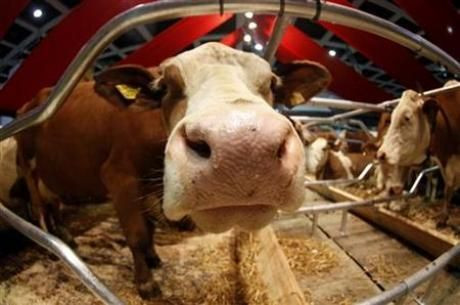Supreme Court to Settle Dispute Between Meat Industry, California

When The Humane Society in 2008 released video of cows unable to stand being kicked, dragged and rammed with forklifts at a California slaughterhouse, the state passed a new law requiring lame animals to be euthanized and prohibiting this kind of inhumane treatment.
California's law banned slaughterhouses from holding or transporting without a sling or sled these non-ambulatory animals. Slaughterhouses were also banned from processing and selling meat from downed animals, which public health experts have said is more likely to be diseased.
Before the law was even in affect, a trade group, the National Meat Association, filed a legal challenge that is now before the U.S. Supreme Court justices.
Like many Supreme Court cases, the actual issue the justices will decide is far drier than the case itself. Here, the justices will consider whether a federal meat inspection law preempts California's law.
Tom Goldstein, the publisher of SCOTUSblog, wrote that the case raises a broader question on the doctrine of presumption against preemption when federal law enters an area in which states have authority.
Under the federal meat inspection law, slaughterhouses are required to hold animals unable to walk or stand for observation in order to detect any diseases. The California law states that slaughterhouses cannot hold such animals without immediately euthanizing them.
The differences between the federal and state requirements are stark, the National Meat Association said in a court brief.
The National Meat Association, which has support from the Obama administration, argue that the federal law clearly prevents states like California from enacting their own statutes affecting slaughterhouse operations or the facilities.
But California disagreed that the state law in question affects slaughterhouse operations, contending that the meat packing trade group defines operations too broadly.
Congress has simply provided procedures that must be followed when an animal is slaughtered for human consumption, California Attorney General Kamala Harris wrote in a brief. California's prohibition on processing non-ambulatory swine for human consumption does not conflict with Congress' regulation of how animals destined for human consumption must be processed.
As for disposing of a downed animal, California says that its guidelines are consistent with federal law. Harris argued in her court brief that the state's requirement for immediate euthanization of downed animals still allows federal inspection for potential diseases.
The lower courts that heard this case are divided on the issue of federal law preempting state statutes. The National Meat Association won an injunction in a federal trial court in California in 2009.
The trial court ruled that states can only ban certain species from being slaughtered, not types of species, like downed pigs.
Hogwash, an appeals court judge wrote in response that overturned the injunction. Federal law regulates the meat inspection process; states are free to decide which animals may be turned into meat.
© Copyright IBTimes 2025. All rights reserved.





















